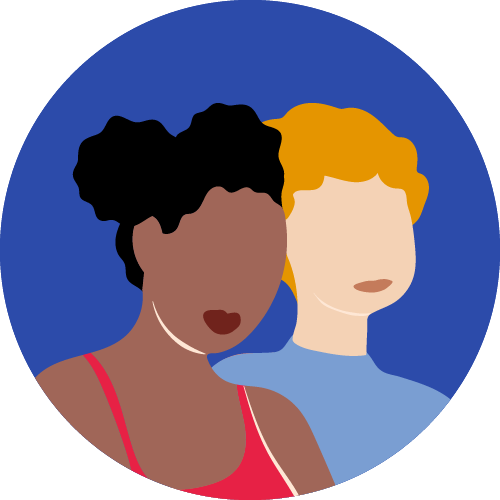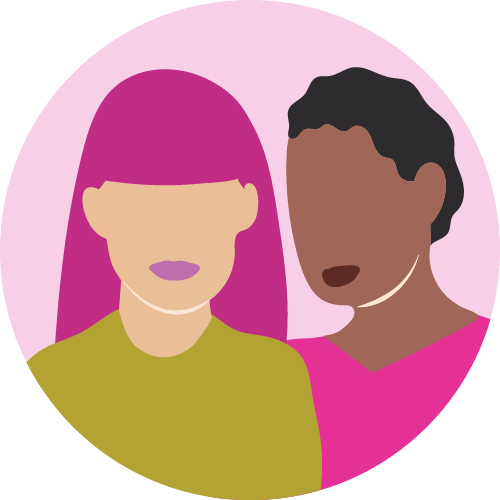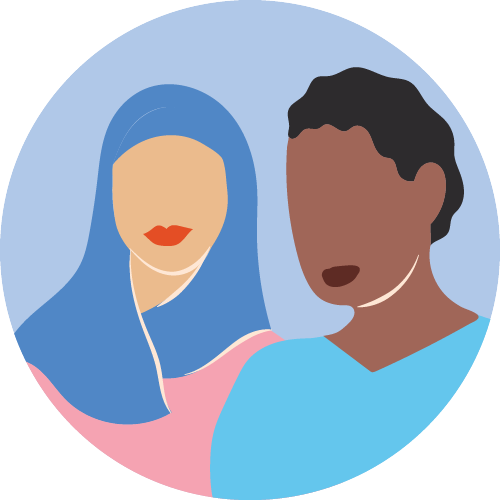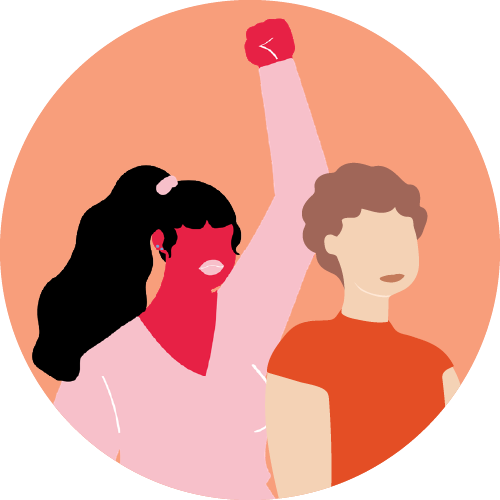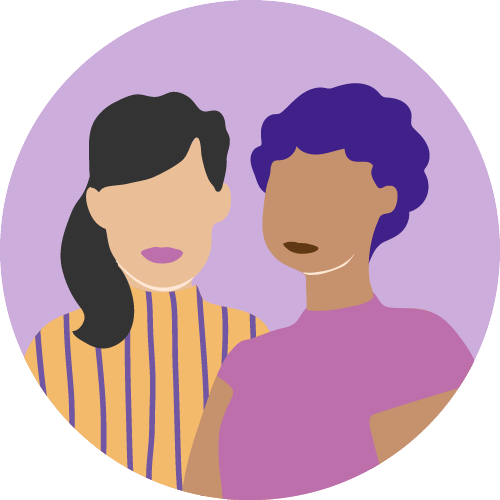This theme illuminates how young people would go about helping a friend who they had concerns for in a relationship. Some young people noted they would tell their friends in a straightforward way about their partners worrying behaviours and suggest they should end the relationship. Others felt they would advise their friend to “be on guard” and keep a close watch on them. Young people frequently try to help friends with toxic relationships but find it difficult. The main barriers that stop them talking to a friend are damaging their friendships, self-doubt and fear (younger age groups and those from a black or minoritised community were less likely to talk to a friend due to self-doubt and fear.).
Theme 5 - Opening their eyes
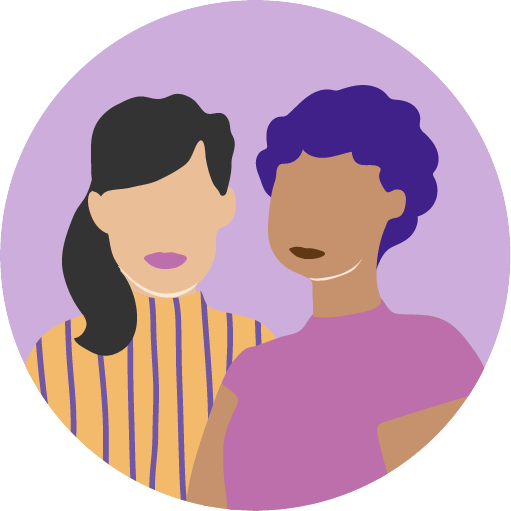
Survey of 641 young people aged 13-24 across England and Wales - August 2021
49%
Said they would 'definitely' be worried about damaging their friendship, if they brought things up
Another way in...
Some young people believed that maintaining a relationship with the person causing harm would be helpful. They felt that this would prevent their friend being isolated and they could call out any unhealthy behaviours in front of their friend.
“Rather, I’d try to hang out with her more. Let her know I’m there for her, and include him in activities. Then every time he shows this kind of behaviour, I’d call him out on it.” - Young person,17-19
“Making it clear that you don't... that's not funny, that's not okay sort of putting them in their place a little bit. Without making the situation worse, but making sure that it's known that, that's actually not funny for you at all. Stand up to hurtful comments.” - Young person, 20-24 years
“Rather, I’d try to hang out with her more. Let her know I’m there for her, and include him in activities. Then every time he shows this kind of behaviour, I’d call him out on it.” - Young person,17-19
“Making it clear that you don't... that's not funny, that's not okay sort of putting them in their place a little bit. Without making the situation worse, but making sure that it's known that, that's actually not funny for you at all. Stand up to hurtful comments.” - Young person, 20-24 years
Helping them see it themselves
Young people felt the best approach (some through actual experience) was to try to make their friend aware to what was happening but in a non-judgemental and non-condescending way. They felt this would help them recognise behaviours, and come to their own conclusions without shutting the conversation down.
"So we, we, sort of, went through, we had, like, a pros and cons list, so we went through all the pros and we went through all the cons and it, sort of, made her realise how, how, like, tipped the scales were, if that makes sense and we gave her advice and we, we tried to tell her that it wasn’t, it wasn’t, like, a normal relationship, like, the dynamic wasn’t normal and it helped her understand.” -
Young person, 13-16
“So, personally, I would be…what did it feel like when he was…if you don't give me the nudes, we're gonna have to take some time apart, what do you think about that? Rather than me putting my input in which is fair but she might not listen to that.” - Young person, 20-24
"So we, we, sort of, went through, we had, like, a pros and cons list, so we went through all the pros and we went through all the cons and it, sort of, made her realise how, how, like, tipped the scales were, if that makes sense and we gave her advice and we, we tried to tell her that it wasn’t, it wasn’t, like, a normal relationship, like, the dynamic wasn’t normal and it helped her understand.” -
Young person, 13-16
“So, personally, I would be…what did it feel like when he was…if you don't give me the nudes, we're gonna have to take some time apart, what do you think about that? Rather than me putting my input in which is fair but she might not listen to that.” - Young person, 20-24
Supporting friends...
Many young people stressed the importance of continuing to support their friend, whatever decisions they made, by championing their self-esteem and confidence. Several young people felt that a friend seeing or listening to advice from other sources could help ‘open their eyes’ as it would be seen as impartial and not a friend’s personal judgement.
“The best thing that I did was to be there for her. Not try and pressure her into breaking up with him, because that's, kind of, being just as bad as him, but, like, to just be emotionally there for her and make sure you’re there to comfort her whenever she's down.”
- Young person, 13-16
“The best thing that I did was to be there for her. Not try and pressure her into breaking up with him, because that's, kind of, being just as bad as him, but, like, to just be emotionally there for her and make sure you’re there to comfort her whenever she's down.”
- Young person, 13-16
Survey of 641 young people aged 13-24 across England and Wales - August 2021
38%
Said fear would 'definitely' stop them talking to a friend
How would you help a friend
going through this?
going through this?
These are all real stories as told to us by young people
- - Trigger warning - please be aware these stories are hard to read. - -
- - Trigger warning - please be aware these stories are hard to read. - -
It is through speaking to friends myself that I realised that my first relationship was toxic. He was manipulative and at times his behaviour was illegal. Being only 19 at the time, I didn’t recognize this until I told friends about him and they supported me with ending the relationship and keeping my mental health stable. As a result I am always very open with friends about my current relationship and always offer non-judgmental advice to my friends to keep the culture of sharing as it is so important to rely on people you trust in these instances
We went through all the pros and we went through all the cons and it, sort of, made her realise how, how, like, tipped the scales were, if that makes sense and we gave her advice and we, we tried to tell her that it wasn’t, it wasn’t, like, a normal relationship, like, the dynamic wasn’t normal and it helped her understand.
The best thing that I did was to be there for her. Not try and pressure her into breaking up with him, because that's, kind of, being just as bad as him, but, like, to just be emotionally there for her and make sure you’re there to comfort her whenever she's down.
I’d try to hang out with her more. Let her know I’m there for her, and include him in activities. Then every time he shows this kind of behaviour, I’d call him out on it.
My friend is really caring and one of the people she was living with was having some mental health problems... she was being kind to him and helping. They were friends and then started sleeping together... He could get into these moods where she said he would become like someone else and would want to hurt himself... she became his sole support. She didn't feel attracted to him anymore, but once he made moves and she said she wasn't into it, he said "Well then go, and I'll be here, on my own...".
I kept being her listening ear and let her know that what was going on was not okay, and that her roommate should seek help... She felt so guilty for not taking better care of him and I, gently but firmly, said I understood where she was coming from, but this was not her responsibility. We would keep talking about this over a few months. I told her that she had been psychologically abused and that I thought he had raped her when he implied he would hurt himself if she didn't sleep with him.
I kept being her listening ear and let her know that what was going on was not okay, and that her roommate should seek help... She felt so guilty for not taking better care of him and I, gently but firmly, said I understood where she was coming from, but this was not her responsibility. We would keep talking about this over a few months. I told her that she had been psychologically abused and that I thought he had raped her when he implied he would hurt himself if she didn't sleep with him.
My friends boyfriend job means that he is on the road all day. Because of this, he rings her all the time, just to chat, as he says it's a boring job. I've told her that this isn't normal as he knows everything she is doing and who she is with and that it's unhealthy that he gets frustrated or annoyed at her when she doesn't answer him...
Myself and her other friends have tried to link her in with support groups or to speak with DA services but she doesn't want 'intervention'. All I can do at this time is be here to offer someone to talk to and try to help her see what support is there but its tough.
Myself and her other friends have tried to link her in with support groups or to speak with DA services but she doesn't want 'intervention'. All I can do at this time is be here to offer someone to talk to and try to help her see what support is there but its tough.
It is through speaking to friends myself that I realised that my first relationship was toxic. He was manipulative and at times his behaviour was illegal. Being only 19 at the time, I didn’t recognize this until I told friends about him and they supported me with ending the relationship and keeping my mental health stable. As a result I am always very open with friends about my current relationship and always offer non-judgmental advice to my friends to keep the culture of sharing as it is so important to rely on people you trust in these instances.
Survey of 641 young people aged 13-24 across England and Wales - August 2021
Non-binary young people were more likely to say self-doubt would definitely stop them than cisgender young people (56% vs 44%)
vs
44%
56%
Things to think about
These are just some of the many questions that might prompt answers:
- How might we help a friend talk through signs in a relationship, so that their friend will see the details themselves?
- How might we use data and storytelling to show young people signs that they might not spot in their own relationships?
- How might we create spaces where young people can hear from outside their own circle of trust?
How might we...?

Survey of 641 young people aged 13-24 across England and Wales - August 2021
45%
Said self-doubt would ‘definitely’ stop them talking to a friend
What are we doing about this?
We're currently working with young people in England and Wales to explore these insights so that we can co-produce resources to tackle the problem. We'll then need your help to get them out into places where young people spend time, both offline and online.
As we learn and create, we'll keep updating this page so please do come back to see more.
If you want to get in touch to help with this theme please contact yourbestfriend@safelives.org.uk
#WhatWillWork #YourBestFriend
As we learn and create, we'll keep updating this page so please do come back to see more.
If you want to get in touch to help with this theme please contact yourbestfriend@safelives.org.uk
#WhatWillWork #YourBestFriend
Explore other themes

